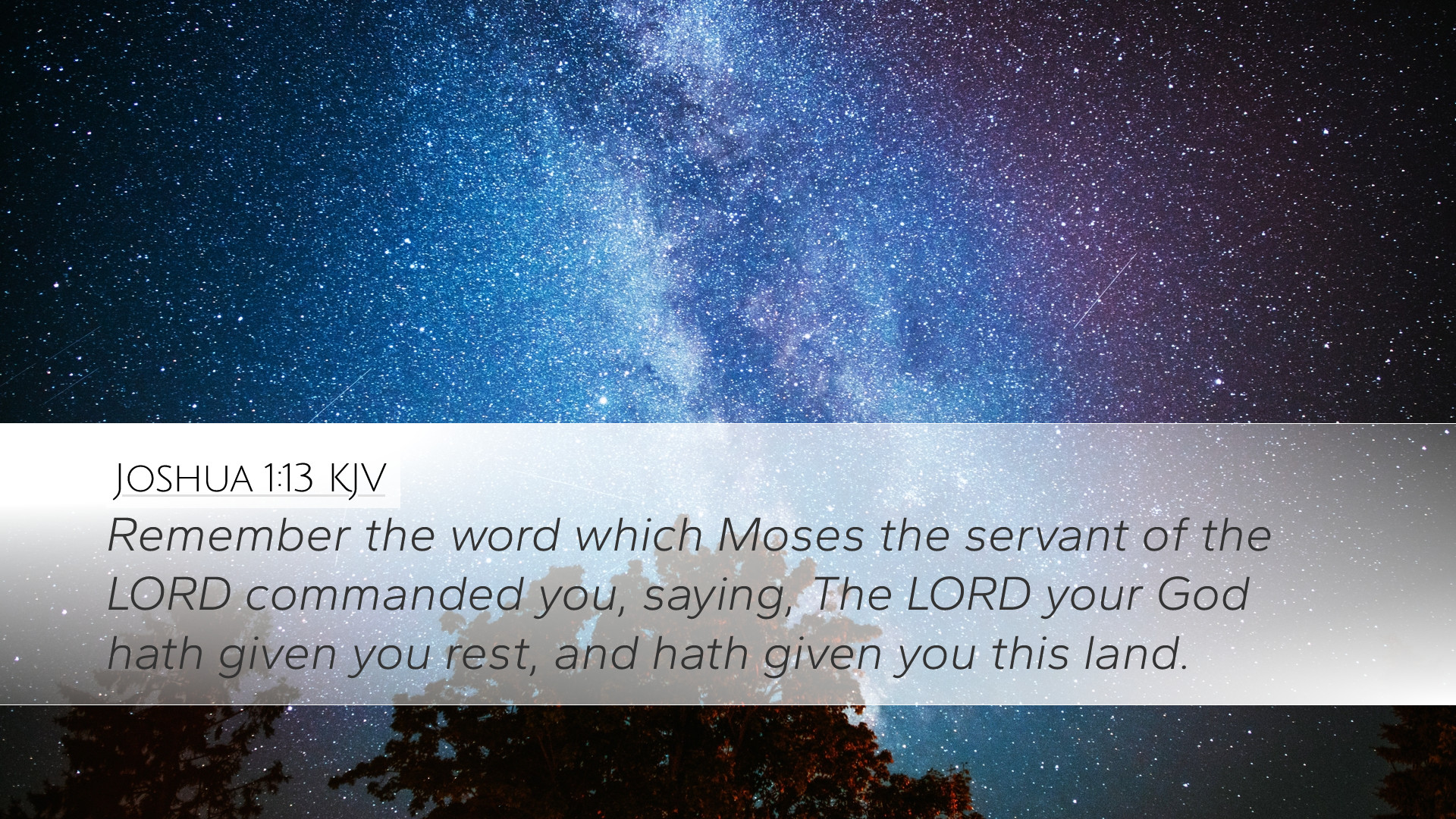Old Testament
Genesis Exodus Leviticus Numbers Deuteronomy Joshua Judges Ruth 1 Samuel 2 Samuel 1 Kings 2 Kings 1 Chronicles 2 Chronicles Ezra Nehemiah Esther Job Psalms Proverbs Ecclesiastes Song of Solomon Isaiah Jeremiah Lamentations Ezekiel Daniel Hosea Joel Amos Obadiah Jonah Micah Nahum Habakkuk Zephaniah Haggai Zechariah MalachiJoshua 1:13
Joshua 1:13 KJV
Remember the word which Moses the servant of the LORD commanded you, saying, The LORD your God hath given you rest, and hath given you this land.
Joshua 1:13 Bible Commentary
Bible Commentary on Joshua 1:13
Introduction
Joshua 1:13 presents a pivotal moment as Israel prepares to enter the Promised Land. In this verse, Joshua reminds the people of God's promises and the conditions of their inheritance. As we explore the insights from various public domain commentaries, including those of Matthew Henry, Albert Barnes, and Adam Clarke, we will uncover layers of meaning with implications for pastors, students, theologians, and scholars.
Context of Joshua 1:13
The Book of Joshua marks a significant transition for the Israelites as they move from wandering in the wilderness to claiming their inheritance. This verse serves to encourage and instruct the people regarding the divine promises made to them, echoing God's faithfulness and the importance of obedience.
Analysis of the Verse
Joshua 1:13 states, "Remember the word which Moses, the servant of the Lord, commanded you, saying, 'The Lord your God has given you rest and has given you this land.'"' This reminder serves several important purposes:
-
Remembrance of Commandments:
Joshua calls the people to remember the commands given by Moses. This act of remembrance is essential, as it ties the current generation to God's covenant and His promises made through Moses (Matthew Henry). It emphasizes continuity in God's plan for His people.
-
Divine Assurance:
The affirmation of rest and possession of the land speaks to the assurance God provides His people. Albert Barnes highlights that rest is not merely physical but encompasses spiritual rest — a peace that comes from reliance on God's promises.
-
Acting on God’s Promise:
The phrase "has given you this land" indicates that while the land is promised, its full possession requires action from the Israelites. Adam Clarke notes this interplay between divine promise and human response, underscoring the necessity of faith manifested through obedience.
Theological Implications
The implications of this verse extend beyond the original audience to contemporary readers. The following sections delve into the key theological insights drawn from Joshua 1:13:
-
God’s Faithfulness:
The assurance of God's promises is a central theme. Just as God remained faithful to the Israelites, believers today can trust in His unchanging character and the fulfillment of His promises (Henry).
-
Importance of Leadership:
Joshua's role as a leader illustrates the importance of guiding a community toward faithfulness and obedience. The transition of leadership from Moses to Joshua highlights the continuity of God's plan and the need for strong spiritual leadership (Barnes).
-
Memory and Tradition:
The call to remember Moses' commandments emphasizes the role of tradition and collective memory in faith communities. It serves as a reminder that understanding our history shapes our identity and guides our future (Clarke).
-
Active Participation:
God’s promises often require an active response from His followers. The inheritance of the land represents both a gift from God and an invitation to participate in His plans through obedience and faithfulness (Henry).
Application for Today
Joshua 1:13 resonates with today's believers as they navigate the complexities of life. The following applications can be drawn from this verse:
-
Encouragement for Trials:
Just as the Israelites faced challenges, believers today should take heart in God's promises amid trials. This verse serves as a reminder of the security found in God's faithfulness (Barnes).
-
Emphasizing Obedience:
The requirement for obedience is timeless. Churches and communities must nurture a culture of obedience to God's Word, recognizing the blessings that flow from such commitment (Clarke).
-
Cultivating Community Memory:
Faith communities should prioritize the teaching and remembering of God's deeds through generations. This act serves to strengthen faith and commitment in both corporate and individual contexts (Henry).
Conclusion
Joshua 1:13 encapsulates a powerful message of remembrance, obedience, and faithfulness. Through the insights of prominent commentaries, it becomes clear that this verse speaks not only to the historical context of Israel's conquest of Canaan but also to the present-day believer's journey. For pastors, students, theologians, and scholars, it provides essential teachings about God's promises, the significance of leadership, and the necessity of active participation in faith. As we reflect on this verse, may we be inspired to trust in God's faithfulness and respond with obedience in our lives.


